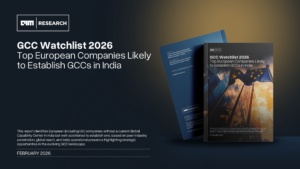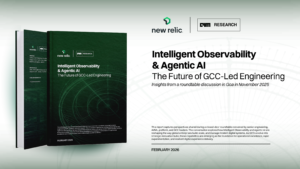Empowering Gen AI teams with frameworks for continuous adaptation and leveraging success is essential in today’s rapidly evolving technological landscape. By providing Gen AI, the next generation of AI-savvy individuals, with the tools, knowledge, and support to adapt and build upon existing successes, we ensure that innovation remains at the forefront of our ever-changing world.
To dwell more on this we had a roundtable discussion on the agenda; “Empowering Gen AI Teams: Frameworks for Continuous Adaptation and Leveraging Success.” The session was moderated by Maharaj Mukherjee, Senior Vice President and Senior Architect Lead at Bank of America with panelists Sreenivas Gadhar, Vice President, Global Data and Analytics – Engineering and Delivery at Marsh McLennan, Avijit Chatterjee, Head of AI/ML and NextGen Analytics at Memorial Sloan Kettering Cancer Center, Rachael Chudoba, Senior Strategist, Planning & Research at Performance Art, Arvind Balasundaram, Executive Director, Commercial Insights & Analytics at Regeneron Pharmaceuticals and Abhay Mitra, Co-Founder & CTO at Nirvana Insurance.
Navigating the Gen AI Experimentation Landscape in Industry
Organizations have started experimenting with Gen AI internally and have created internal engines. They are experimenting with simple use cases, such as documenting meeting notes, summarizing documents, and identifying their contents. This is particularly valuable when dealing with large terms and conditions documents – especially with fine prints – will be useful to provide improved customer experience. I foresee more use cases emerging in the Property and Casualty (P&C) insurance industry.
In the healthcare and insurance sectors, the confidentiality and ethical behavior of Gen AI models will be of utmost importance. There have been issues in the insurance industry regarding underwriting, pricing, claims adjudication due to biases in the AI models.
Human accountability will increase with the adoption of Gen AI. It’s not just about accepting the output from Gen AI and using it as is. It would involve validation and ensuring that it won’t lead to any problems – related to copyright or privacy or other sensitive issues – and will call for enhanced human accountability.
– Sreenivas Gadhar, Vice President, Global Data and Analytics – Engineering and Delivery at Marsh McLennan
Transforming Cancer Research and Healthcare with AI Innovations
We are exploring the application of AI in the field of cancer research, seeking ways in which the world of cancer can benefit from AI. I work for an institution with significant expertise in AI, spanning areas like digital technology, radiology, pathology, and clinical practice. Even before the rise of Generative AI, we were already exploring language models for question answering. Of course, one of the most common applications has been enhancing enterprise search, which we still believe is in its early stages of development. Intelligent search technology has a long way to go, but with Generative AI, it is showing great promise.
The next significant area where I foresee Generative AI playing a pivotal role is with Electronic Health Records (EHR). It has the potential to enhance the patient experience significantly. The medical terminology within EHRs could be translated into plain English for everyone to understand. Furthermore, it can improve clinician productivity, by having AI analyze patient queries and associated medical reports and generate a draft response, which providers can then review and fine-tune before finalizing and sending it out.
– Avijit Chatterjee, Head of AI/ML and NextGen Analytics at Memorial Sloan Kettering Cancer Center
Exploring the Intersection of Gen AI in Advertising and Mental Health Protection
What’s really exciting about advertising’s use of Gen AI is that we are using it internally every day. We use it strategically for brainstorming and creatively for image generation. Many people across various disciplines in advertising, spanning all types of agencies, are enthusiastic about utilizing Gen AI for everyday use cases within the advertising workflow. However, Gen AI doesn’t provide the rights and protections that client work typically requires. So, it’s been an interesting balancing act for us. Internally, we want to use it every day, but externally, we have to wait for more legislation to meet client requirements. This creates an interesting middle ground.
In my studies, I am attempting to determine whether Gen AI can lead us into a space where advertisers use Gen AI to identify if someone has a mental health vulnerability such as bipolar disorder, manic depression, or anxiety, and use this information to inform consumer personas and journeys. Through Gen AI, we can scale specific messages to targeted individuals, but when these messages are based on coping behaviors exhibited by mental vulnerabilities, the ethics of Gen AI must be addressed. This intersection of industry and academia is creating a truly exciting space.
– Rachael Chudoba, Senior Strategist, Planning & Research at Performance Art
Charting the Evolution of Gen AI in Finance and Insurance
Gen AI in the finance and insurance industry will manifest at a different pace than other industries given a high bar of accuracy and explainability. One aspect of this is a long-term investment in understanding when and how it will impact areas like underwriting and pricing. However there are also clear near term opportunities. Insurance, in particular, deals with a significant amount of unstructured data, including various files and images. The information is often either unorganized or organized in a way that severely hampers the speed of iteration.
In my perspective, there are two main focuses in the medium or near term:
- How to leverage Gen AI to enhance the end customer experience
- How to maximize the value from the data we already possess to drive differentiation in pricing and underwriting
These priorities will drive innovation and adaptation in the finance and insurance sectors.
– Abhay Mitra, Co-Founder & CTO at Nirvana Insurance
Charting a Course for Generative AI Advancement
In our field, in particular, there wasn’t much of a choice when it came to whether you wanted to engage in Generative AI. So, I consider that a blessing. We are very much on the journey and actually began quite early. We compartmentalized Generative AI on its own, separating it from the classic AI applications that everybody else is doing. We are very much in the thick of it and enjoying it as we go. I think what is of phenomenal importance to us for generative AI, drug discovery, drug development, and even on the commercial side is really its effectiveness over efficiency. Ultimately, the question that will be on the table for enterprises is, “Where is the value that this unlocks with the investment?” And so, ultimately, it’s going to come down to multiple modalities.
– Arvind Balasundaram, Executive Director, Commercial Insights & Analytics at Regeneron Pharmaceuticals
Concluding thoughts by the moderator
We had a very thought provoking round table. The round table discussion was joined by industry leaders representing different segments of industry from healthcare providers and research lab, biotechnology industry, insurance industry to advertising and media industry. The leaders discussed where they are in their journey for accomplishing their goals on genAI. They are also at different mileposts in their journey, some are just starting and yet some are at very advanced levels. Each leader also discussed their pain points such as availability of good data scientists, hardware and GPU banks to more complex issues like ownership of the outcome as well as explainability of the results and how they are trying to mitigate these pain points.
– Maharaj Mukherjee, Senior Vice President and Senior Architect Lead at Bank of America






